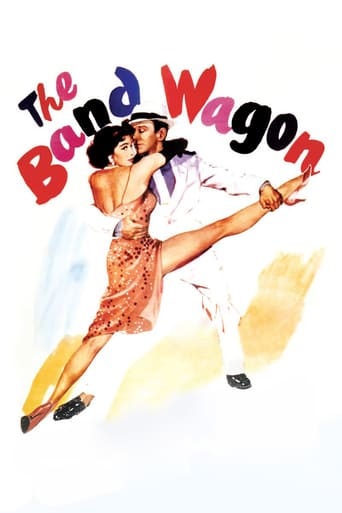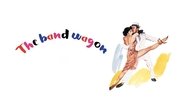gavin6942
A pretentiously artistic director is hired for a new Broadway musical and changes it beyond recognition.Many critics rank this film, along with "Singin' in the Rain", as the finest of the Metro-Goldwyn-Mayer musicals, although it was only a modest box-office success. I have to agree with those critics. Although I am not huge on musicals, every so often one speaks to me, and this was one of them. Definitely one of MGM's best, quite possibly Minnelli's best (I tend to think his work is overrated).Fred Astaire does not necessarily get his best dance moves here, but he gets to act and play the distinguished elder of the dancing community. Among his later films, this is definitely one of the best... I would be torn between this and "Daddy Long Legs".
ioannites
Minelli's great master piece is undoubtedly The Band Wagon. Although it tells the commonplace story of a show and the plot is classic, that is to have a project for a show, the difficulties and success of life, Vicente Minnelli has succeeded in creating a movie of fine psychological analysis, prompting the spectator to think about society. Thus the Director responds well to those who have severely criticized musicals. Another element which gives particular value to this movie is the ballet Girl Hunt. Inspired by detective movies, Minnelli also has a lot of humor, humanity and poetry. It is a well stylized ballet. This belongs to a category of movies without violence and perhaps without cruelty. These days we no longer see musicals of this quality and the opportunity to see such masterpieces as The Band Wagon in more cinemas would be welcomed.
weezeralfalfa
About 30 min too long, for me. Much of the between the musical numbers drama was painful for me to sit through. Oscar Levant and Jack Buchanan were generally a bore, not to mention Fred and Cyd in their May-December attraction-repulsion problem. Spritely Nanette Fabray is good in her Judy Garland-like role. While leggy Cyd was often a joy to watch in romantic, seductive or ballet numbers, she was no Judy Garland when it came to acting, comedy or singing(always dubbed). Some of her early dialogue makes her look like a school girl: not promising for an eventual romantic connection with Fred's mature character.I don't understand Cyd's rating of her dance with Fred to "Dancing in the Dark" as her favorite dance in her film career. It's a scenic romantic dance, no doubt, to a classic romantic song, staged as a spontaneous dance, making it seem more romantic. Fred does several partial lifts and supports. Unlike most male dancers, her never seemed to do full lifts, apparently being too weak(very skinny) to do so. Otherwise, I don't see this dance as being especially distinguished. Rather reminds me of Fred and Ginger or Rita. There are, of course, several additional memorable songs or dance routines. So, with fast forward DVD technology, this film is worth checking out, for those who enjoy watching dancing without slogging through the between verbiage.Along with a visible Fred, Cyd and others, the unseen musical stars are composer Arthur Schwartz, mostly with lyricist Howard Dietz, who collaborated, on and off, for decades, beginning in the late '20s, both being New Yorkers. Most of their best remembered songs are from several revues in the early-mid '30s, during the depths of The Depression. This film takes its title from one of these revues. However, the list of songs includes some from other shows during this period, as well as a couple of new compositions. By far, the most remembered of the latter is "That's Entertainment", which came to be the title and theme song for a series of compendia DVDs of the best musical moments in MGM films. In addition to being a lyricist, Dietz was important to MGM in spearheading many publicity campaigns and premieres, and came up with the roaring lion to start their films.Aware that most of the songs included were composed during The Depression, rather than during the relatively prosperous and optimistic '50s, gives us a better insight into the lyrics of the songs and even the plot of this film. The original "Band Wagon" was a musical revue, thus had no story to tell. It incidentally featured the dancing of Fred and his sister in their last stage performances before she retired for marriage and Fred went off to Hollywood. The screenplay concocted for this film involves an aging song and dance man(Fred) trying to decide whether to retire or try to find a new young partner(Cyd)to put some new spice into his act. While this had immediate personal relevance to Fred, it could also serve as an allegory to the state of mind of many people during The Depression. In Fred's first songs: "By Myself" and "With Shine on My Shoes", he's trying to cheer himself up, thumbing his nose at his recent professional flops, trying to convince himself that he can restart his career with the right new partner. Similarly, people during The Depression had hopes that prosperity would eventually return. While these scenes offer no remarkable dances, the inclusion of genuine African American shoeshine 'boy' Leroy Daniels, who attracted customers with song and comical dances, added more spice to Fred's adventures in the arcade.Yes, "Dancing in the Dark", at one level, provides a beautiful romantic tune and lyrics. The latter is saying that the combo of a new love and music can make us feel young again and have a joyful life as a team. But, it also has a realistic fatalistic component, in effect, reminding us that life is rather short and very uncertain(symbolized by darkness), hence we must be aggressive in finding and holding onto the most compatible mate we can find, to help make the most of our uncertain limited lives.The most innovative productions come toward the end. This includes the unique and very difficult(and painful) to do "The Triplets", in with Fred, Nanette and Buchanan are dressed as fraternal triplet babies, sing and do some 'dancing', with short artificial legs strapped to their knees: very awkward to deal with! The lyrics mostly emphasize the downside of being triplets...But the highlight of the film surely is the last big production: "The Girl Hunt": a very avant garde dance drama, lampooning the film noire genre. Fred plays Rod Riley: a NYC detective, who goes through a series of adventures, especially involving a team of gangster goons, a seductive blond and a seductive brunet(presumably both Cyd). The various scenes really have little connectivity, but all are interestingly staged, presumably by the talented choreographer Michael Kidd. In the end, Cyd appears to accompany Fred, after he has 'done in' the baddies. He remarks that she's clearly bad and dangerous(presumably a gangster's moll), but his kind of woman, nonetheless. ..Just before this production, Fred' character hints a marriage proposal to Cyd, but she says "I wish you wouldn't". But after the show, Cyd hints at a marriage proposal to Fred's character. The finale, in which all the principles join in a reprise of "That's Entertainment", provides the desired 'feel good' ending.




